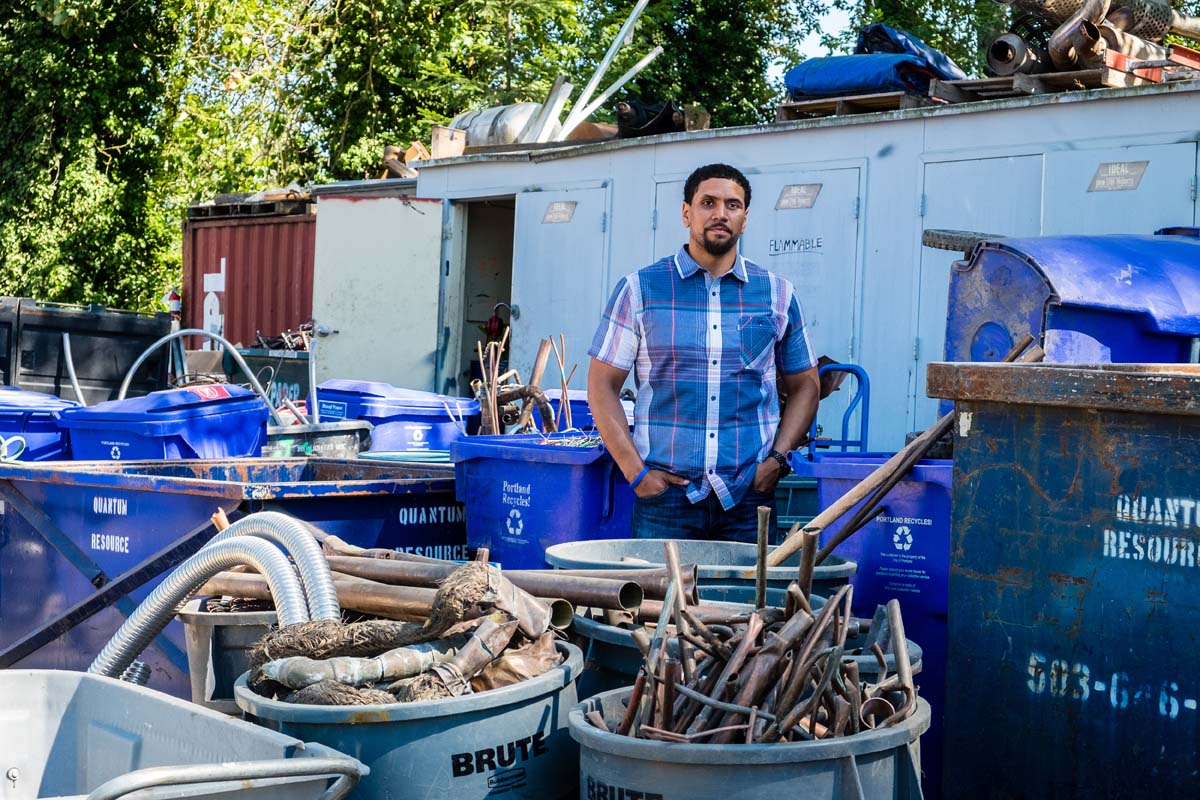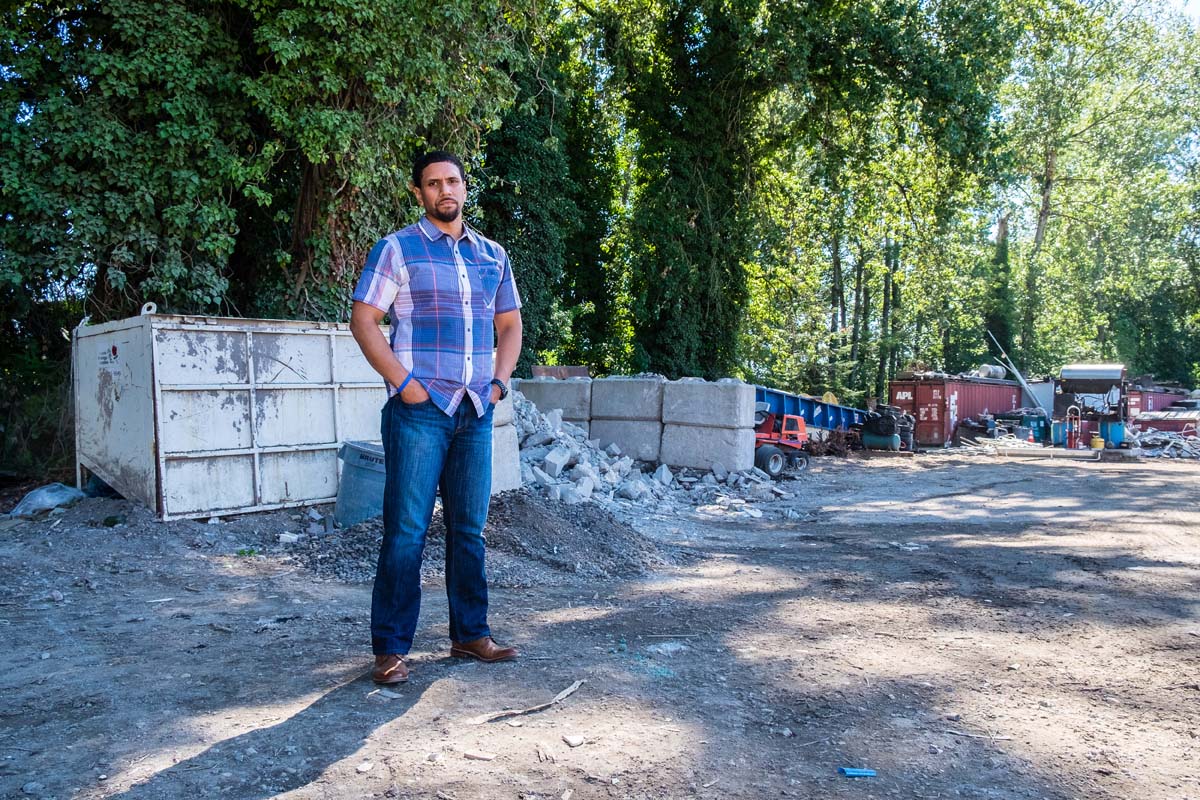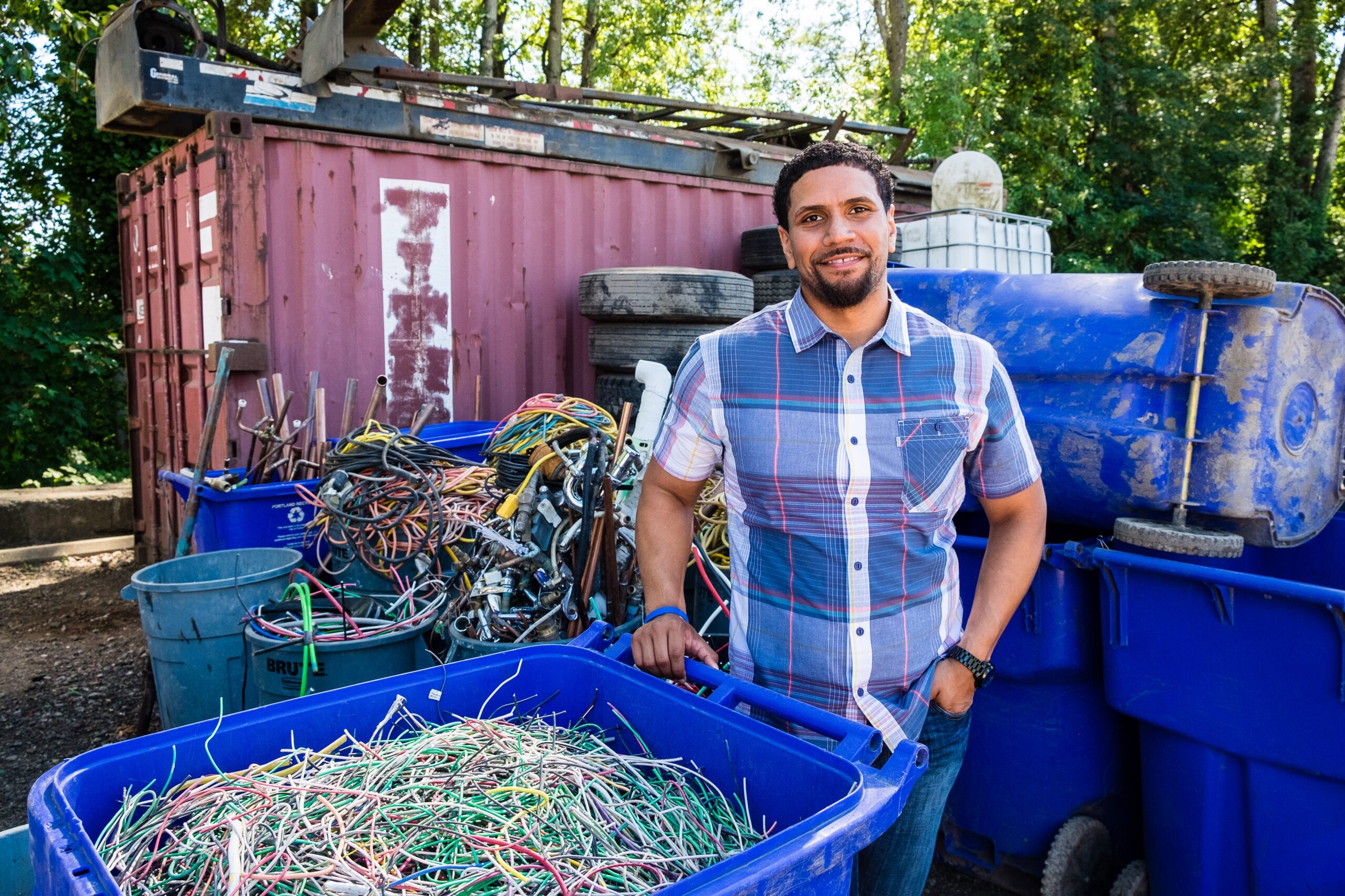The vice president of City of Roses Disposal & Recycling talks about the solid waste business, family values and a new generation of “inequity” refugees.
Alando Simpson, a young, charismatic East Portland civic and business leader, wants to get one thing straight.
“I don’t have any political aspirations. Politics can dance around the truth, and I don’t feel we have time to dance around the truth given the way the world is. We’re not in a stable situation as a country. I want to get right to the point and focus solely on the power I have as a business to support the community in which we function.”
Simpson, 33, is the vice president of City of Roses Disposal and Recycling. The business was founded by his father, Al, in 1996 and has expanded from a garbage hauling firm into a multi-platform waste and recycling facility.
As the business has grown, so has Simpson’s leadership profile. The father of two is a member of the Oregon Transportation Commission, a former chair of the Oregon Sports Authority Advisory Council and is becoming a sought after speaker on the sustainability circuit. (Simpson participated in an Oregon Business panel on B-Corp companies last June).
“It’s my responsibility not to be here solely for the purpose of making money unless in the process of making money I’m uplifting folks with me,” says Simpson, who on a weekday morning is in his office, located in a trailer on the company’s Parkrose acreage.
Simpson had values of community uplift drilled into him from a young age. His aunt, Noni Causey, runs BEAM, a black educational achievement nonprofit that provides a platform and conduit for young people to get exposed to diverse career pathways.
“As opposed to the entertainment field,” Simpson says. “That’s something I’m passionately interested in: Broadening opportunities for youth of color, specifically African-Americans — looking into ways in which they can gain more economic prosperity.”
From his father, Al, Simpson says, he learned the true meaning of sustainability. “There are not many people that hold the character he does,” he says. His father, now 61, has a good head for business. “But he views it through the lens of: it’s important to pass on to the next generation so they can have a foundation to grow and prosper.”
His parents laid the foundation. Higher education helped build the frame. Simpson says he didn’t think about the built environment as part of a broader sustainability ecosystem until he enrolled in Portland State University as an undergraduate. “That’s where I saw an opportunity to help my father grow his business and have that in alignment with what the city wanted aspirationally.”
Simpson graduated from PSU with a communications and business degree. But first, he drifted. He lived in Atlanta for a year, where he worked as a business manager for a friend who was in the NBA, He worked as mortgage broker Lake Oswego only to get laid off in 2007.
At that point Simpson decided to strike out on his own — by coming back to the family business. “I didn’t want any one or anything to dictate my success in life. I want my work ethic, my resilience, to define where I will go.” (Although Simpson comes across as affable and easy going, he says he can rub people the wrong way. “Like, he has an attitude. I’ve learned to channel that as I’ve grown up.”)
The business is growing too. City of Roses employs 28 people and generates revenues of about $2.5 million. The company has doubled its income and number of employees since 2013, when the company launched CORE recycling, a division that collects and processes construction waste, electronics and yard debris.
“Before then, we were just hauling materials around, which is a very low margin industry,” Simpson says. “When you get into processing, which is in essence manufacturing, you’re utilizing raw materials to create a finished product.”

In their first year of operation, the company was able to recycle 68% of waste it hauled, earning recognition as the leading facility in the region for recycling. City of Roses followed up last year by adding a deconstruction division that salvages, sells and repurposes wood from demolished buildings.
“We live in a world of garbage,” Simpson says. “People throw things away nonstop. So what can we be doing with these materials to provide a new job, salvage some of our carbon emissions in our local ecosystem and provide products in a closed loop cycle?”
Simpson is tightlipped about the company’s R&D initiatives, although he does allude to renewable energy facilities. (His wife, works for Vestas, the wind energy company). His competitors in the highly regulated waste industry include billion-dollar corporations like Waste Management, he says. “At any time they can shift and say this is where the trend is. I’m just working on getting prepared for when the shifts come.”
In recent years, a new generation of African-American leaders has sounded the message of black entrepreneurship, blended with civic purpose. Albina Bank vice president Stephen Green launched PitchBlack, an event aimed at connecting black entrepreneurs to new economy industries and the venture capital that supports it.
Elevate Capital, a new venture capital firm in Portland, includes an inclusive startup fund, aimed at minority owned businesses. And Mike Green, whom I profiled in a cover story several years ago, continues to spread his gospel of inclusive innovation.
Simpson seems both separate and a part of these efforts. Garbage is not exactly a sexy new economy industry, although renewable energy would certainly add a 21st-century flavor. His civic engagement started slowly. The first organization he got involved with was the city of Portland small business advisory council. Simpson says he was fascinated by the impact of government regulations on small business. His “persistent chiming in” caught the attention of other committee members, and Simpson eventually became chair.
Around the same time, former Gov. Kitzhaber’s community engagement chief, Kendall Clawson, was actively recruiting people of color to be on boards and commissions. “She said: ‘is there anything you are interested in?’” Simpson recalls. “I saw the Oregon Sustainability Board, and I said, ‘Yeah, I’m interested in that.” [Simpson is a former OSB member.]
“It’s really about being intentional, about building relationships one at a time,” Simpson says. “That’s how I became civically engaged.” He also became a victim of his own success. In the past year he’s turned down eight board positions while scaling back existing commitments. That includes his work at the Sports Authority, where he ran a sports camp for several years.
“The platform was a template to use sport as a vehicle to help youth build relationships and to break down the ambiguity of fear and unknown as they grow up as adults in the city.” Simpson says. He estimates he spends a quarter of his time working on the Oregon Transportation Commission — “that’s a big dollar spend” — and also serves on the board of the National Association of Minority Contractors and the city’s deconstruction advisory committee.

In all of these positions, Simpson’s goals coalesce around a diversity theme. He envisions a future in which people move to Portland not only “because it’s a cool, hipster city with a walkable corridor but also immigrant families move here, families in distressed circumstances move here.” Just as global warming is creating a new class of climate refugees, high-priced cities are creating “inequitable refugees,” Simpson says.
More people are talking about diversity issues today than in the past, Simpson agrees. “But the indicators are not moving.”
“If we are going around touting ourselves as the most sustainable city in the world, let’s stop focusing on being this two legged tripod. Because equity is something we suck at quite frankly. We need to man up to what we are really doing here that is sustainable for future generations, not just right now.”
City of Roses is helping that happen by creating career pathways for “second chance ” employees, people (mostly African-Americans) who are coming out of the incarceration system.
“If I don’t have a career pathway for a recycling technician to go from $12/hour, to being an equipment operator making $35 bucks an hour, then I’m not doing my job,” Simpson says. “This person now has the means and resources to buy a home to build equity and wealth, break the cycle of poverty and participate in the health of the community.”
So no, politics as a vehicle for change is not his wheelhouse.
“The federal government is no longer there for cities to depend on,” Simpson says. “It’s going to come from local communities that have rooted passion for the local ecosystem, with the support of local government, educational institutions. That’s how we start shifting the dial.”
“It’s not about changing Portland; it’s about changing the world.”
Correction appended: The article has been corrected to reflect the following change. Noni Causey is Alando Simpson’s aunt, not his mother.




